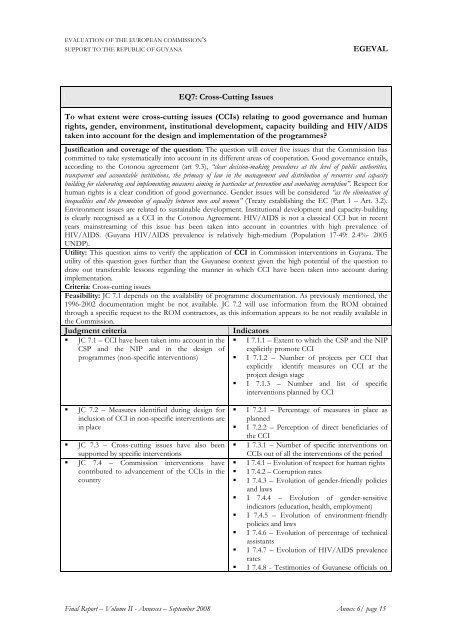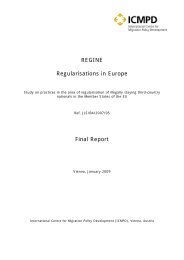Annexes - European Commission - Europa
Annexes - European Commission - Europa
Annexes - European Commission - Europa
Create successful ePaper yourself
Turn your PDF publications into a flip-book with our unique Google optimized e-Paper software.
EVALUATION OF THE EUROPEAN COMMISSION’S<br />
SUPPORT TO THE REPUBLIC OF GUYANA<br />
EGEVAL<br />
EQ7: Cross-Cutting Issues<br />
To what extent were cross-cutting issues (CCIs) relating to good governance and human<br />
rights, gender, environment, institutional development, capacity building and HIV/AIDS<br />
taken into account for the design and implementation of the programmes?<br />
Justification and coverage of the question: The question will cover five issues that the <strong>Commission</strong> has<br />
committed to take systematically into account in its different areas of cooperation. Good governance entails,<br />
according to the Cotonou agreement (art 9.3), “clear decision-making procedures at the level of public authorities,<br />
transparent and accountable institutions, the primacy of law in the management and distribution of resources and capacity<br />
building for elaborating and implementing measures aiming in particular at prevention and combating corruption”. Respect for<br />
human rights is a clear condition of good governance. Gender issues will be considered “as the elimination of<br />
inequalities and the promotion of equality between men and women” (Treaty establishing the EC (Part 1 – Art. 3.2).<br />
Environment issues are related to sustainable development. Institutional development and capacity-building<br />
is clearly recognised as a CCI in the Cotonou Agreement. HIV/AIDS is not a classical CCI but in recent<br />
years mainstreaming of this issue has been taken into account in countries with high prevalence of<br />
HIV/AIDS. (Guyana HIV/AIDS prevalence is relatively high-medium (Population 17-49: 2.4%- 2005<br />
UNDP).<br />
Utility: This question aims to verify the application of CCI in <strong>Commission</strong> interventions in Guyana. The<br />
utility of this question goes further than the Guyanese context given the high potential of the question to<br />
draw out transferable lessons regarding the manner in which CCI have been taken into account during<br />
implementation.<br />
Criteria: Cross-cutting issues<br />
Feasibility: JC 7.1 depends on the availability of programme documentation. As previously mentioned, the<br />
1996-2002 documentation might be not available. JC 7.2 will use information from the ROM obtained<br />
through a specific request to the ROM contractors, as this information appears to be not readily available in<br />
the <strong>Commission</strong>.<br />
Judgment criteria<br />
• JC 7.1 – CCI have been taken into account in the<br />
CSP and the NIP and in the design of<br />
programmes (non-specific interventions)<br />
Indicators<br />
• I 7.1.1 – Extent to which the CSP and the NIP<br />
explicitly promote CCI<br />
• I 7.1.2 – Number of projects per CCI that<br />
explicitly identify measures on CCI at the<br />
project design stage<br />
• I 7.1.3 – Number and list of specific<br />
interventions planned by CCI<br />
• JC 7.2 – Measures identified during design for<br />
inclusion of CCI in non-specific interventions are<br />
in place<br />
• JC 7.3 – Cross-cutting issues have also been<br />
supported by specific interventions<br />
• JC 7.4 – <strong>Commission</strong> interventions have<br />
contributed to advancement of the CCIs in the<br />
country<br />
• I 7.2.1 – Percentage of measures in place as<br />
planned<br />
• I 7.2.2 – Perception of direct beneficiaries of<br />
the CCI<br />
• I 7.3.1 – Number of specific interventions on<br />
CCIs out of all the interventions of the period<br />
• I 7.4.1 – Evolution of respect for human rights<br />
• I 7.4.2 – Corruption rates<br />
• I 7.4.3 – Evolution of gender-friendly policies<br />
and laws<br />
• I 7.4.4 – Evolution of gender-sensitive<br />
indicators (education, health, employment)<br />
• I 7.4.5 – Evolution of environment-friendly<br />
policies and laws<br />
• I 7.4.6 – Evolution of percentage of technical<br />
assistants<br />
• I 7.4.7 – Evolution of HIV/AIDS prevalence<br />
rates<br />
• I 7.4.8 - Testimonies of Guyanese officials on<br />
Final Report – Volume II - <strong>Annexes</strong> – September 2008 Annex 6/ page 15
















